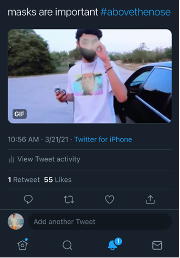By: Courtney Pham, Senior Marketing Instructor, Missouri State University
This past year has been especially challenging, if not difficult, for students and instructors shifting online. Instructors had to consider synchronous or asynchronous lectures and come up with thoughtful techniques to keep the students engaged. I wanted to know some challenges students were facing when taking online classes. To find out, I did a quick survey at the beginning of the Summer 2020 semester.
The most overwhelming response students experienced when taking online classes was the disconnect between the instructors and the students. Aimed with this newfound information, I had to think outside of the box to keep my students actively engaged for the upcoming semesters. The online course format has its challenges, but it also offers a number of solutions.
Awarding Extra Credit through Experiential Learning
I also challenged each of my sections to outperform one another. I motivated them by giving extra points to the section with the highest average exam scores in MindTap. This motivated students to read their textbook, understand the material, and achieve high scores on their MindTap assignments. It’s amazing how much extra credit can influence students’ motivation to perform better.
For the Fall 2020 and Spring 2021 semesters, all of my classes were delivered online and structured asynchronously. I incentivized the students braving my weekly modules by offering synchronous Zoom sessions twice a month for extra credit. My reason was twofold: to connect with my students and to increase participation. The number of points students could earn was based on their insightful responses tied to current business events and chapter concepts. I encouraged students to prepare for the Zoom sessions by watching videos provided by Cengage.
During the Spring 2020 semester, one of my Zoom sessions discussed the Super Bowl and the upsides and downsides of big brand names not spending money advertising products, but instead promoting COVID-19 vaccines. For those not able to join Zoom, I offered the extra credit opportunity in a two-step discussion post. The first step was to come up with their own hashtag to promote positive movements toward combating COVID-19. For the second step, they had to post it on their own social media accounts and gain at least 50 likes to earn points. Most students loved this project and came up with excellent concepts. Below are just a few.



Study Abroad with Experiential Learning
Every summer, I take a group of students to emerging markets for experiential learning opportunities. They can learn about logistics, meet experts in their majors, and engage in different management styles based on cultures. I have not been able to pursue this opportunity due to the pandemic (the whole concept of education abroad is also being redefined due to global movement and the changing reality of the travel industry).
Thanks to technological advancement and innovative programs, study abroad can now take place anywhere virtually. I recently proposed a virtual program to Vietnam where students in my Marketing class could learn from other university students in Vietnam to exchange cultural values as well as learn foreign languages. I would invite guest speakers to present to my classes via Zoom to talk about their relevant areas of expertise in the business world. All would be accomplished without leaving the comfort of our homes.
Experiential Learning Increases Student Engagement
The percentage of student engagement level, recorded in MindTap, in my Principles of Marketing classes hovers between 88 and 93 percent. This number speaks volumes and serves as a reminder that my strategies to help engage my students worked!
There are many ways to introduce real-world experience to my classes without leaving the campus. I don’t need to change the rules of the game. Instead, I need to re-strategize my game using tools like MindTap and my own creativity. As an instructor, my most frequent feedback on students’ marketing projects is “be creative” or “think outside the box.” It is about time I take my own advice and be a game changer.
Online teaching comes with its fair share of technical blunders. Check out 7 funny stories from instructors teaching online!


